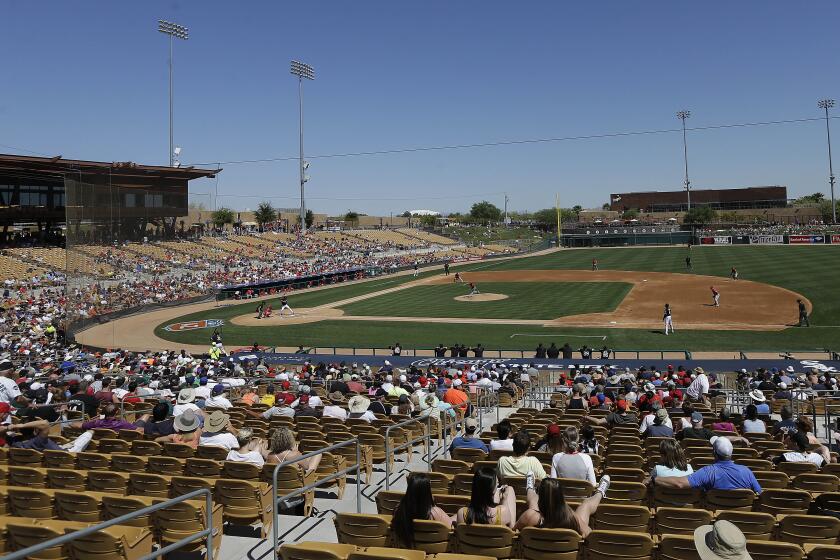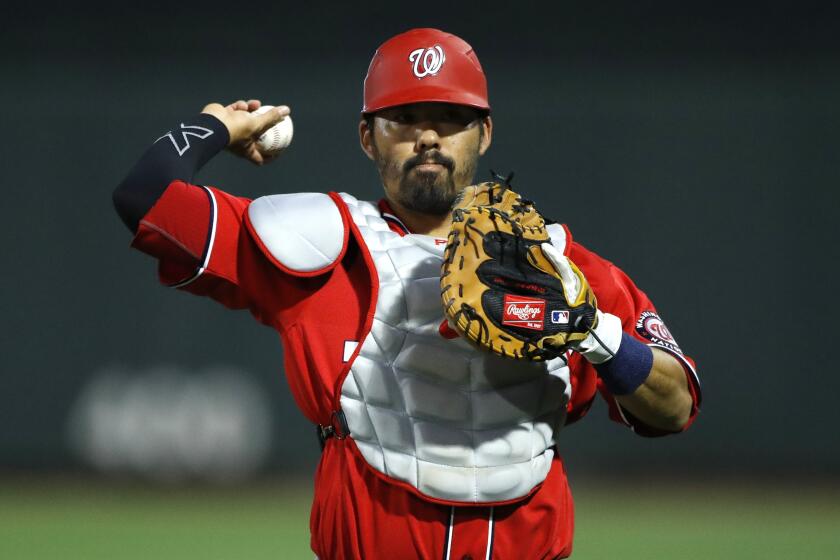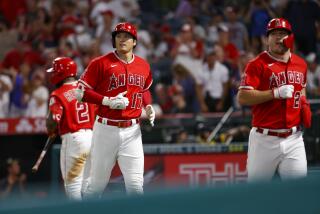Judge dismisses Bubba Harkins defamation lawsuit against Angels, MLB

- Share via
An Orange County Superior Court judge on Monday granted a motion by the Angels and Major League Baseball to dismiss a defamation complaint by Brian Harkins, the long-time visiting clubhouse manager who was fired last March after the Angels learned he was providing a blend of sticky substances to visiting pitchers to aid their grip of the baseball.
Daniel L. Rasmussen, an attorney representing Harkins, said he plans to appeal the ruling in the next 60 days.
“We’ll regroup, lick our wounds and move to the next level,” Rasmussen said early Monday evening. “None of these cases are easy, so sometimes you have to ask a reviewing court to make sure you’re getting the right answers.”
Harkins, 55, filed suit last Aug. 28, claiming he was made a “public scapegoat” in baseball’s efforts to crack down on the use of foreign substances. The complaint listed “defamation” and “false light” as causes of action against the Angels and MLB.
Arizona officials asked MLB to postpone spring training because of virus surge. Players worry that doing so might trim the season and salaries.
Harkins, who spent nearly four decades with the team, claimed he was fired without warning, labeled a “traitor, cheater and a fraud” in the wake of news reports of his dismissal and is now unemployable.
But the sources confirming the reasons for Harkins’ firing in initial news reports last March were anonymous, and to prove defamation, a plaintiff must prove who exactly defamed you.
After conducting a 30-minute hearing with attorneys for both sides Thursday, Judge Geoffrey Glass issued his ruling Monday afternoon.
“Published statements do not support the allegation that MLB or the Angels authorized those statements,” Glass wrote. “In order to hold an organization liable for defamation, the person saying the defamatory things must be authorized to speak on behalf of the organization.”
Because Harkins could not identify who was responsible for the publication of defamatory statements, Glass ruled that statements in news reports were “inadmissible hearsay.”
Harkins, nicknamed “Bubba,” was fired by former Angels general manager Billy Eppler last spring, three days after MLB issued a memo to teams saying it would be enforcing a long-ignored policy forbidding the use of illegal substances to enhance a pitcher’s grip.
Hitters rarely complain about the use of such substances because a better grip usually means better control — and less chance of being hit in the head by a 97-mph fastball.
Harkins alleged three false statements by the Angels and MLB — that he was distributing an illegal substance, that he was betraying the Angels by only helping opposing teams and that he was doctoring baseballs.
Kurt Suzuki might not have been best all-around catcher available in free agency, but he does offer something valuable for the Angels’ pitching staff.
Harkins submitted evidence in court filings that numerous Angels — including Troy Percival, Brendan Donnelly, Tyler Chatwood, Kevin Jepsen and, most recently, Cam Bedrosian, Keynan Middleton, Yusmeiro Petit, Luke Bard, Matt Andriese, Dylan Peters, Jose Suarez and Dylan Bundy — used his concoction of rosin and pine tar, known as “the sticky stuff,” over the years.
Percival, the Angels closer from 1995-2004, acknowledged in September that he taught Harkins how to make the mixture in spring training “mostly because it was so dry in Arizona and the balls were so slick out there.”
Harkins also claimed that MLB has evidence implicating several star pitchers — including Gerrit Cole, Justin Verlander, Max Scherzer, Felix Hernandez, Corey Kluber and Adam Wainwright — for using foreign substances to improve their grip on the ball. Though Harkins acknowledged that he supplied the substances, he claims he did not personally apply them to baseballs.
“The basic facts of making the concoction, providing it to Angels pitchers, providing it to visiting pitchers, MLB’s interpretations of the rules and so on are not contested,” Glass wrote. “Further they are not defamatory on their face.
“Essentially what is claimed to be unfair is that Mr. Harkins was punished for it when others were not and that he should not have been fired for it. That may be a basis for an employment action, but not for defamation.”
More to Read
Go beyond the scoreboard
Get the latest on L.A.'s teams in the daily Sports Report newsletter.
You may occasionally receive promotional content from the Los Angeles Times.









